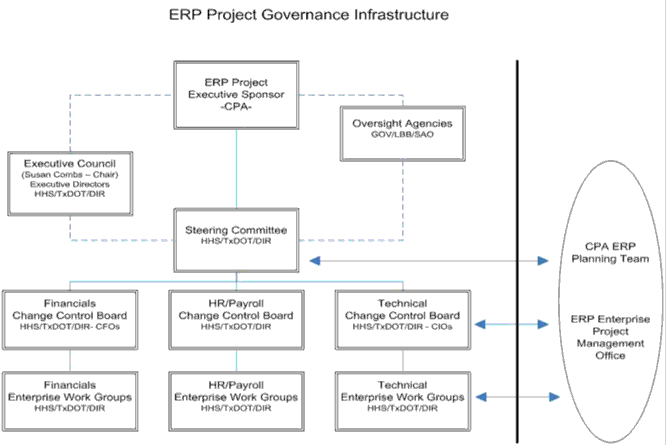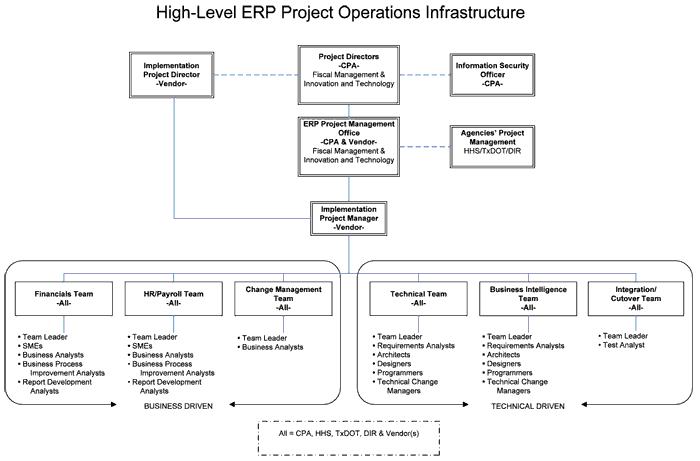ProjectONE Report to the 82nd Legislature
Appendix F: ProjectONE Governance Structure
The following information follows the Statewide ERP Project Plan and Project Charter (dated July 17, 2009) as approved by CPA, DIR, HHS, TxDOT and the Statewide Quality Assurance Team (QAT).
Project Governance
ProjectONE governance provides an effective infrastructure for addressing issue resolution and approval while promoting communication through all functional areas of the project. The following chart provides the high-level governance structure for ProjectONE. This structure may change as necessary in support of the addition of other agencies, recommendations of the implementation vendor and/or restructuring of ProjectONE due to unforeseen circumstances or events. Any changes to the project governance must be approved by the ProjectONE Steering Committee.
The Comptroller of Public Accounts (CPA) is following standard project management methodologies to secure executive sponsorship, concept and business case approval, as well as to ensure effective planning of activities and use of resources.
All agencies working on ProjectONE have agreed to an approach of governing by consensus, thus ensuring that all agency concerns will be acknowledged and that the resulting system will be the best possible solution for the state of Texas. This approach begins at the Enterprise Workgroup Level and carries through to the Executive Council.

The Executive Council is responsible for managing executive communications on project-related matters with CPA, providing executive input to the Steering Committee, disseminating project innovations within members’ organizations and advocating for the implementation of approved standardized business processes and data across all agencies. The Executive Council serves as the highest (final) escalation decision point in the resolution of project issues.
The Executive Council is chaired by the Comptroller (or Deputy Comptroller in the Comptroller’s absence) and meets quarterly or as determined necessary. Executive Council members consist of one executive director/commissioner from the Texas Department of Transportation (TxDOT), the Department of Information Resources (DIR) and the five Health and Human Services (HHS) agencies: the Department of Aging and Disability Services (DADS), the Department of Assistive and Rehabilitative Services (DARS), the Department of Family and Protective Services (DFPS), the Department of State Health Services (DSHS) and the Health and Human Services Commission (HHSC).
Oversight Agencies consist of participants from the Governor’s Office, the Legislative Budget Board and the State Auditor’s Office. The Oversight Agencies communicate with the Comptroller on high level project matters.
The Steering Committee is responsible for providing direction to the Change Control Boards (CCBs), providing advice and guidance to project management and serving as the project liaison to both the Executive Council and Oversight Agencies. The Steering Committee also addresses project roadblocks and provides resolution to project issues elevated by the CCBs. The Steering Committee members are executive sponsors of ProjectONE and demonstrate an “enterprise” approach to solving statewide project issues. The Steering Committee meets bi-weekly or as necessary and is co-chaired by the CPA Director of Fiscal Management and CPA Director of Innovation and Technology. Steering Committee members consist of one executive management member from TxDOT, DIR and HHS.
The Steering Committee includes:
- Victor Gonzalez (CPA)
- Phillip Ashley (CPA)
- James Bass (TxDOT)
- Charlotte Willis (HHSC)
- Bob Saathoff (DIR)
The Change Control Boards (CCBs ) consist of agency chief financial officers (CFOs), chief information officers (CIOs) and human resource and payroll directors (or their assigned representatives) from TxDOT, DIR and each of the five HHS agencies (DADS, DARS, DFPS, DSHS, HHSC). The Financial CCB is chaired by the CPA assistant director of Fiscal Management; the HR/Payroll CCB is chaired by the CPA director of Fiscal Projects; and the Technical CCB is chaired by the CPA area manager for ISAS/ERP Support. The CCBs are responsible for making recommendations to the Steering Committee after reviewing all standardization and/or modifications recommended by the Enterprise Work Groups. The CCBs review and recommend for Steering Committee approval all project deliverables submitted for their review. The CCBs also review and provide resolution as appropriate to project issues submitted by the Enterprise Work Groups. The CCBs elevate project issues, as necessary, to the Steering Committee. The CCB members demonstrate an “enterprise” approach to solving statewide ERP issues.
The Enterprise Work Groups (EWGs) are comprised of deploying agency subject matter experts who are grouped according to project tasks. In most cases, they function as teams defined by functional areas or ERP modules. Each EWG is chaired by a designated functional or technical project lead. Besides being subject matter experts, EWG members are cooperative, “enterprise” minded, creative thinkers who strive to reach consensus on assigned project tasks. Among other duties, members develop and confirm business requirements; assess system and functional requirements and recommend standardization and/or modification of business processes to the CCBs. As an integral part of the issue escalation process, EWGs submit unresolved project issues to the CCBs as needed.
The Project Management Office (PMO) consists of both state and contracted project management resources. The PMO ensures compliance with goals, objectives, project management guidelines, standards, scope, risk identification and mitigation, quality management, budget, reporting and documentation. This group ensures that state staff and contracted resources are leveraged effectively across the project and reviews and recommends approval of deliverables. The PMO also coordinates activities across the ERP governance structure. Finally, the PMO is responsible for monitoring the project work plan, as well as activities, timelines and risks, and has overall responsibility for reporting on the status of activities, milestones and deliverables.
The CPA ProjectONE Planning Team is comprised of CPA management from the following divisions: Fiscal Management, Innovation and Technology, Texas Procurement and Support Services, Strategic Sourcing, and Budget and Internal Accounting. This team’s role is to continually assess strategy and approach and provide recommendations to ensure that CAPPS is implemented in a manner that supports the state’s overall ERP vision. The team’s responsibility of communicating and managing project vision spans all levels of project governance and includes review of Enterprise Work Group progress; project status, initiatives, issues, timelines, resources and solutions; and anything else that requires a broader review and expeditious resolution.
Issue Escalation Process
ProjectONE governance is built on the premise that issues may be introduced at any level. Regardless of the source of the issue or at what level it is communicated, project management must consider the issue and route it to the appropriate team for resolution. In some cases, an issue may be assigned to an EWG. In other cases, it may be immediately elevated to the Steering Committee.
Ideally, issues are resolved at the first level of review, but this is not always possible. ProjectONE’s issue escalation process is typical of ERP projects and allows for issues to move to higher levels of expertise and authority as needed.
Project Organization and Management
The following charts depict the organizational structure for the ERP Project:
